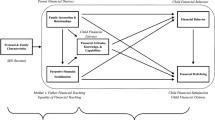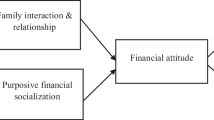Abstract
This study investigated the relationship between young adults’ closeness with their parents, their self-reported money management behaviors, and worry about money as mediated through young adults’ self-reported responsibility. The sample of 1632 young adults aged from 18 to 27, was obtained from the Panel Study of Income Dynamics—Transition into Adulthood Supplement (2015), and was 48.0% male and 49.8% white. A path analysis tested the conceptual model based on the family financial socialization theory (FFST) (Gudmunson and Danes, Journal of Family and Economic Issues 32:644–667, 2011). The results demonstrate that closeness with both fathers and mothers was positively associated with financial behaviors mediated through young adults’ self-reported responsibility after controlling for age, parents’ education and financial assistance from the family. However, only closeness with father had a direct association with positive self-reported money management behaviors and an indirect association with worry about money. Young adults’ self-reported responsibility, in terms of their financial capabilities, resulted in an indirect effect on worry about money through self-reported money management behaviors. We discuss the meaning of the effects of closeness with parents as a domain-general factor on financial outcomes.

Similar content being viewed by others
References
Arnett, J. (2001). Conceptions of the transition to adulthood: Perspectives from adolescence through midlife. Journal of Adult Development, 8(2), 133–143. https://doi.org/10.1023/A:1026450103225
Arnett, J. J. (2004). Emerging adulthood: The winding road from the late teens through the twenties. New York: Oxford University Press.
Allen, M. W. (2008). Consumer finance and parent-child communication. In J. J. Xiao (Ed.), Handbook of consumer finance research (pp. 351–361). New York: Springer.
Allen, M. W., Edwards, R., Hayhoe, C. R., & Leach, L. (2007). Imagined interaction, attitudes towards money and credit, and family coalitions. Journal of Family and Economic Issues, 28(1), 3–22. https://doi.org/10.1007/s10834-006-9048-1
Bell, M. M., Nelson, J. S., Spann, S. M., Molloy, C. J., Britt, S. L., & Nelson Goff, B. S. (2014). The impact of financial resources on soldier’s well-being. Journal of Financial Counseling and Planning, 25(1), 41–52.
Betz, N. E., & Fitzgerald, L. F. (1987). The career psychology of women. New York: Academic Press.
Brougham, R. R., Jacobs-Lawson, J. M., Hershey, D. A., & Trujillo, K. M. (2011). Who pays your debt? An important question for understanding compulsive buying among American college students. International Journal of Consumer Studies, 35(1), 79–85. https://doi.org/10.1111/j.1470-6431.2010.00923.x
Bucciol, A., & Veronesi, M. (2014). Teaching children to save: What is the best strategy for lifetime savings? Journal of Economic Psychology, 45, 1–17. https://doi.org/10.1016/j.joep.2014.07.003
Cheung, G. W., & Lau, R. S. (2008). Testing mediation and suppression effects. Organizational Research Methods, 11(852), 1–30. https://doi.org/10.1177/1094428107300343
Chowa, G. A. N., & Despard, M. R. (2014). The influence of parental financial socialization on youth’s financial behavior: Evidence from ghana. Journal of Family and Economic Issues, 35(3), 376–389. https://doi.org/10.1007/s10834-013-9377-9
Côté, J. E. (2002). The role of identity capital in the transition to adulthood: The individualization thesis examined. Journal of Youth Studies, 5, 117–134. https://doi.org/10.1080/13676260220134403
Curran, M. A., Parrott, E., Ahn, S. Y., Serido, J., & Shim, S. (2018). Young adults’ life outcomes and well-being: Perceived financial socialization from parents, the romantic partner, and young adults’ own financial behaviors. Journal of Family and Economic Issues, 39(3), 445–456. https://doi.org/10.1007/s10834-018-9572-9
Danes, S. M. (1994). Parental perceptions of children’s financial socialization. Financial Counseling and Planning, 5, 127–146.
Danes, S. M., & Yang, Y. (2014). Assessment of the use of theories within the Journal of Financial Counseling and Planning and the contribution of the family financial socialization conceptual model. Journal of Financial Counseling and Planning, 25(1), 53–68.
Darling, N., & Steinberg, L. (1993). Parenting style as context: An integrative model. Psychological bulletin, 113(3), 487. https://doi.org/10.1037/0033-2909.113.3.487
Deenanath, V., Danes, S. M., & Jang, J. (2019). Purposive and Unintentional Family Financial Socialization, Subjective Financial Knowledge, and Financial Behavior of High School Students. Journal of Financial Counseling and Planning, 30(1), 83–96.
Enders, C. K. (2010). Applied Missing Data Analysis. New York: Guilford Press.
Flouri, E. (2004). Exploring the relationship between mothers’ and fathers’ parenting practices and children’s materialist values. Journal of Economic Psychology, 25(6), 743–752. https://doi.org/10.1016/j.joep.2003.06.005
Grusec, J. E., & Davidov, M. (2010). Integrating different perspectiveson socialization theory and research: A domain-specific approach. Child Development, 81(3), 687–709. https://doi.org/10.1111/j.1467-8624.2010.01426.x
Grusec, J. E., & Goodnow, J. J. (1994). Impact of parental discipline methods on the child’s internalization of values: A reconceptualization of current points of view. Developmental Psychology, 30(1), 4–19. https://doi.org/10.1037/0012-1649.30.1.4
Gudmunson, C. G., & Danes, S. M. (2011). Family financial socialization : Theory and critical review. Journal of Family and Economic Issues, 32, 644–667. https://doi.org/10.1007/s10834-011-9275-y
Gutter, M., & Copur, Z. (2011). Financial behaviors and financial well-being of college students: Evidence from a national survey. Journal of Family and Economic Issues, 32, 699–714. https://doi.org/10.1007/s10834-011-9255-2
Hoffman, J. J., Hofacker, C., & Goldsmith, E. B. (1992). How closeness affects parental influence on business college students’ career choices. Journal of Career Development, 19(1), 65–73.
Hong, . (2000). The criteria for selecting appropriate fit indices in structural equation modeling and their rationales. Korean Journal of Clinical Psychology, 19(10), 161–177.
Jorgensen, B. L., Foster, D., Jensen, J. F., & Vieira, E. (2017). Financial attitudes and responsible spending behavior of emerging adults: Does geographic location matter? Journal of Family and Economic Issues, 38(1), 70–83.
Jorgensen, B. L., Rappleyea, D. L., Schweichler, J. T., Fang, X., & Moran, M. E. (2017). The financial behavior of emerging adults: A family financial socialization approach. Journal of Family and Economic Issues, 38(1), 57–69.
Jorgensen, B. L., & Savla, J. (2010). Financialliteracyofyoungadults:Theimportanceofparental socialization. Family Relations, 59(4), 465–478. https://doi.org/10.1111/j.1741-3729.2010.00616.x
Kim, J., & Chatterjee, S. (2013). Childhood financial socialization and young adults’ financial management. Journal of Financial Counseling and Planning, 24, 61–79.
Kim, J. H., & Torquati, J. (2019). Financial socialization of college students: Domain-general and domain-specific perspectives. Journal of Family and Economic Issues, 40(2), 226–236. https://doi.org/10.1007/s10834-018-9590-7
Kim, J., LaTaillade, J., & Kim, H. (2011). Family processes and adolescents’ financial behaviors. Journal of family and economic issues, 32(4), 668–679. https://doi.org/10.1007/s10834-011-9270-3
Lanz, M., Sorgente, A., & Danes, S. M. (2019). Implicit family financial socialization and emerging adults’ financial well-being: A multi-informant approach. Emerging Adulthood. https://doi.org/10.1177/2167696819876752
LeBaron, A. B., Hill, E. J., Rosa, C. M., & Marks, L. D. (2018). Whats and hows of family financial socialization: Retrospective reports of emerging adults, parents, and grandparents. Family Relations, 67(4), 497–509.
Letkiewicz, J. C., Lim, H., Heckman, S. J., & Montalto, C. P. (2019). Parental financial socialization: Is too much help leading to debt ignorance among college students? Family and Consumer Sciences Research Journal, 48(2), 149–164. https://doi.org/10.1111/fcsr.12341
Mortimer, J. T. (2003). Working and growing up in America. Cambridge: Harvard University Press.
Norvilitis, J. M., & Mendes-Da-Silva, W. (2013). Attitudes toward credit and finances among college students in Brazil and the United States. Journal of Business Theory and Practice, 1(1), 132–151.
Oman, R. F., Vesely, S. K., Aspy, C. B., & Tolma, E. L. (2015). Prospective associations among assets and successful transition to early adulthood. American Journal of Public Health, 105(1), e51–e56. https://doi.org/10.2105/AJPH.2014.302310
Palmer, T. S., Pinto, M. B., & Parente, D. H. (2001). College students’ credit card debt and the role of parental involvement: implications for public policy. Journal of Public Policy & Marketing, 20(1), 105–113. https://doi.org/10.1509/jppm.20.1.105.17293
Parke, R. D., & Buriel, R. (2006). Socialization in the family: Ethnic and ecological perspectives. Handbook of child psychology, 3, 1097–1149. https://doi.org/10.1002/9780470147658.chpsy0308
Serido, J., Shim, S., Mishra, A., & Tang, C. (2010). Financial parenting, financial coping behaviors, and well-being of emerging adults. Family Relations, 59(4), 453–464. https://doi.org/10.1111/j.1741-3729.2010.00615.x
Shim, S., Barber, B. L., Card, N. A., Xiao, J. J., & Serido, J. (2010). Financial socialization of first-year college students: The roles of parents, work, and education. Journal of youth and adolescence, 39(12), 1457–1470. https://doi.org/10.1007/s10964-009-9432-x
Shim, S., Serido, J., & Tang, C. (2012). The ant and the grasshopper revisited: The present psychological benefits of saving and future oriented financial behaviors. Journal of Economic Psychology, 33(1), 155–165. https://doi.org/10.1016/j.joep.2011.08.005
Shim, S., Serido, J., & Xiao, J. J. (2009). Arizona pathways to life success for university students (APLUS): Cultivating positive financial attitudes and behaviors for healthy adulthood. Tucson, AZ: University of Arizona.
Sorgente, A., & Lanz, M. (2017). Emerging adults’ financial well-being: A scoping review. Adolescent Research Review, 2(4), 255–292.
Spector, P. E., & Brannick, M. T. (2011). Methodological urban legends: The misuse of statistical control variables. Organizational Research Methods, 14(2), 287–305. https://doi.org/10.1177/1094428110369842
Tang, N. (2017). Like father like son: how does parents’ financial behavior affect their children’s financial behavior? Journal of Consumer Affairs, 51(2), 284–311. https://doi.org/10.1111/joca.12122
Vieno, A., Nation, M., Pastore, M., & Santinello, M. (2009). Parenting and antisocial behavior: A model of the relationship between adolescent self-disclosure, parental closeness, parental control, and adolescent antisocial behavior. Developmental psychology, 45(6), 1509. https://doi.org/10.1037/a0016929
Xiao, J. J., Ahn, S. Y., Serido, J., & Shim, S. (2014). Earlier financial literacy and later financial behaviors of college students. International Journal of Consumer Studies, 38(6), 593–601. https://doi.org/10.1111/ijcs.12122
Author information
Authors and Affiliations
Corresponding author
Ethics declarations
Conflict of interest
The authors declare that they have no conflict of interest relating to this research study.
Ethical Approval
All procedures performed in studies involving human participants were in accordance with the ethical standards of the institutional and/or national research committee and with the 1964 Helsinki declaration and its later amendments or comparable ethical standards.
Informed Consent
Informed consent was obtained from all individual participants included in the study.
Additional information
Publisher's Note
Springer Nature remains neutral with regard to jurisdictional claims in published maps and institutional affiliations.
This is one of several papers published together in Journal of Family and Economic Issues on the “Special Issue on Couples, Families, and Finances”.
Rights and permissions
About this article
Cite this article
Kim, J.H., Torquati, J. Are You Close with Your Parents? The Mediation Effects of Parent–Child Closeness on Young Adults’ Financial Socialization Through Young Adults’ Self-reported Responsibility. J Fam Econ Iss 42, 314–324 (2021). https://doi.org/10.1007/s10834-020-09725-5
Accepted:
Published:
Issue Date:
DOI: https://doi.org/10.1007/s10834-020-09725-5




